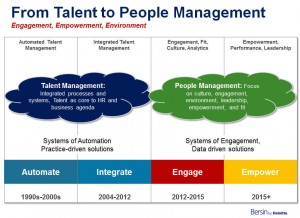Now that all the Year in Review and Year in Pictures articles have concluded, it’s time to move on to the predictions for the coming year. I’m by no means an “official” prognosticator. Yet I see a trend that has been building over the last several months in the federal HR space – a renewed emphasis on performance management in relation to talent management and people management – that leads me to believe that 2015 might be the year of performance management for federal agencies.
Now, that might seem an odd pick, given that there is so much talk about talent analytics, integrated talent management, and now people management, with an emphasis on employee engagement and empowerment. But I don’t mean any of those topics are not growing in importance and interest from federal HR leaders and professionals – they are, and they are the future of federal human capital management.
Performance Management is a central component
I see performance management as a central component of the major HR trends. They all have a critical bidirectional flow with the performance management element. As agencies delve into talent analytics and more integrated talent management pillars such as talent acquisition, onboarding, succession planning and learning and development, they begin to understand that performance management is a key to all talent management components within federal agencies.
In addition, even as agencies understand that the future is in talent analytics, integrated talent management and more, the reality is often more realistic. If you are going to walk before you run, performance management is a great companion for that stroll into better overall talent management.
Even as industry analyst and expert Josh Bersin begins to move away from the word “talent” and suggest we might consider “people” and all that word encompasses, I believe so much of it still goes back to performance management. As Josh writes, “whether you are a leader, manager, or HR professional, we need our organizations to succeed.”
True – and federal agencies need to get their arms around their employees’ performance.
Even as the conversation is extended beyond integrated talent management to better employee engagement, empowerment and people management, almost all ties back to how employees are performing. If performance can be improved, through whatever means, then HR will be well served by leading the agencu in figuring out how to do that. HR can show the way for hiring managers and other leaders.

HR will be in a position to provide more insight, answer more questions and ask more probing questions, such as:
- What is the relationship to employee engagement and performance?
- What insight does employee engagement data provide for retention?
- How should top performers be positioned in the agency’s succession planning?
- Do the agency’s employee assessments lead to anticipated performance?
- Which, if any, onboarding processes help new employees begin performing at a high level more quickly?
- Does more empowerment lead to improved performance?
- Which teams are better performers and why? Is it more tied to the manager or the employees skills, engagement or aptitude.
The list of questions is virtually limitless, as is the insight to be gleaned.
As Josh indicates, “talent management” is not dead and “the concepts and principles are not going away. But as an area of focus, we in HR have to think more broadly.” He goes on to say that “talent management is now people management and it has to take on a much broader perspective and holistic approach.”
True.
And so much of “people management” comes down to employee performance and performance management.
Performance management a stepping stone
While the Holy Grail for HR may be shifting from “integrated talent management” to a more sweeping “people management,” for most agencies dealing on a more manageable and gradual approach to their ultimate goals, the focus might be best assigned to employee performance.
For some, that might make 2015 the Year of Performance Management for federal agencies.





This is a really interesting post, and I suppose we’ll just have to wait and see, right? Since some federal agencies lag industry trends, we might not get there this year! I really like the idea of using embedded performance support systems rather than a standalone suite of TMS tools.
Thanks for the comment, Dave, I agree with you that certainly federal agencies often lag industry trends. So while it’s nice to have a long-term goal, I think some real gains can be made in the short term by tackling certain areas, and the performance piece really seems ideal for this. Thanks.